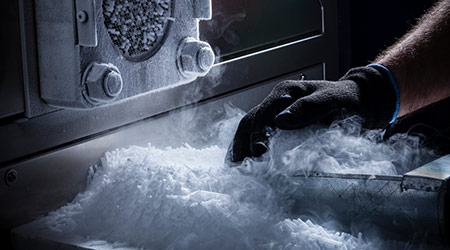As doses of the COVID-19 vaccines roll out across the nation, maintenance and engineering workers in hospitals and other healthcare facilities face a potential risk in storing and handling the medications due to the use of dry ice. These super-cold blocks of carbon dioxide are necessary for keeping the temperamental vaccines at the right temperature. The Pfizer vaccine, for example, must be stored at minus 94 degrees Fahrenheit.
To protect workers, OSHA offers tips for staying safe when using dry ice to store and transport COVID-19 vaccines. Among the recommendations:
• Use cryogenic gloves, which are designed specifically for working in freezers below -80 degrees Celsius and for handling containers or vials stored in freezers.
• Cryogenic gloves need to be loose-fitting so that they can be readily removed if liquid nitrogen splashes into them or a piece of dry ice falls into them.
• Always use appropriate eye protection.
• Do not use or store dry ice or liquid nitrogen in confined areas, walk-in refrigerators, environmental chambers or rooms without ventilation. A leak in such an area could cause an oxygen-deficient atmosphere.
Click here to read the OSHA fact sheet.

 Oracle Health Hit by Data Breach, Patient Data Possibly Compromised
Oracle Health Hit by Data Breach, Patient Data Possibly Compromised Ground Broken on New MD Anderson Sugar Land Facility
Ground Broken on New MD Anderson Sugar Land Facility Florida State University Reveals Plans for Panama City Beach Hospital
Florida State University Reveals Plans for Panama City Beach Hospital The Effect of Over-Cleaning on Human Health
The Effect of Over-Cleaning on Human Health Rumored Terror Threat to Hospitals Prompts FBI Warning
Rumored Terror Threat to Hospitals Prompts FBI Warning